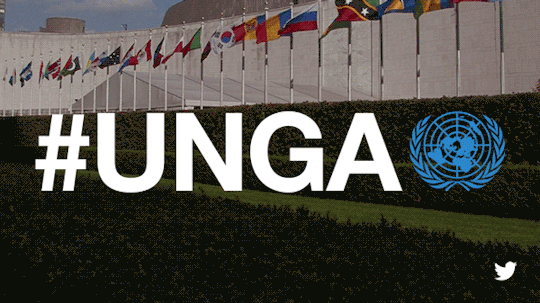So, as the busiest week in international diplomacy is over now, here is what I thought of the general debate this year.

The 72nd session of the UN General Assembly is well underway and of course keeps going on until next fall. Its most prominent week though with high level officials representing their countries on the GA floor is over now, with the closing of the general debate on Monday.
The general debate must seem boring for many. I don’t think there is any one person who sits down and listens to almost 200 speeches in a row for days. Truth be told, most of them are tedious. Repetitious, I shall say. No offense intended towards the speakers, in fact I am pretty sure many of them even share my opinion. These remarks are only meant to be interesting if coming from a major world power with a significant message or coming from a country with a current crisis or one that have a role in a current crisis. I wanted to add if they are coming from dictatorships, but sadly, not even that is outstanding anymore.
The most anticipated speech was of course delivered by US President Donald Trump, full of questionable points that I am not going to detail for it is also the one that got the most media coverage.
The major powers mainly repeated the same concerns as the US, although in a much more responsible and diplomatic manner. It was also interesting listening to representatives of countries that the US directly addressed, i.e. North Korea about who’s being on a suicide mission and Iran about the Joint Comprehensive Plan of Action.
As a Hungarian, I was interested in what the representative of Hungary had to say at the UN, I even took the time to listen to it real time on Friday evening, and I wasn’t pleased. Given their track record I wasn’t really surprised either by the harsh language Foreign Minister Péter Szijjártó used to emphasize the Hungarian government’s position that terrorism is a direct outcome of growing migration. He criticized leaders who believe migration is a natural progress that need to be regulated rather than suppressed, for their irresponsable behaviour. Meaning of course Angela Merkel in the first place, but it could be understood for a few other world leaders, including the UN Secretary General himself. The rest of the speech was about Ukraine’s recent education law.
Anyway, then there are ongoing crises, plenty of them in Africa or the Arab world, that just don’t get the attention, not even on UN week. Take the speakers of Somalia, South Sudan, Nigeria or Yemen to name just a few. They all face internal conflicts and a major famine in their countries, with almost no media attention. Same could be told for small island nations endangered by climate change. Yet, the GA Hall is only full for the first morning of the general debate and attention decreases from then on.
To end on a positive note still, I found Secretary General Antonio Guterres’ first GA opening speech very powerful and inspiring. Also, there were a bunch of side events either organized by the UN itself or held outside the UN by different NGOs that raised hope that no matter how grave the state of the world seems right now, there are ways to make it better and people who are willing to work to do so.

